Internet Censorship Trends in 2025: Which Countries Are Tightening Controls?
Internet censorship and government Internet restrictions are finding their way even in countries where such measures were believed to be unthinkable. We see unexpected blocks in European democratic countries like Poland, Norway, and others, and even some signs of Internet censorship in America and Japan. The tendency is clear: Internet users may find their online freedom at stake.
In this article, we will discuss worldwide Internet censorship, covering the facts and cases about the most censored countries and how governments have begun to limit online speech at the Internet service providers (ISP) level. Finally, we’ll explore the go-to ways you can take to protect your online freedom and bypass Internet restrictions.
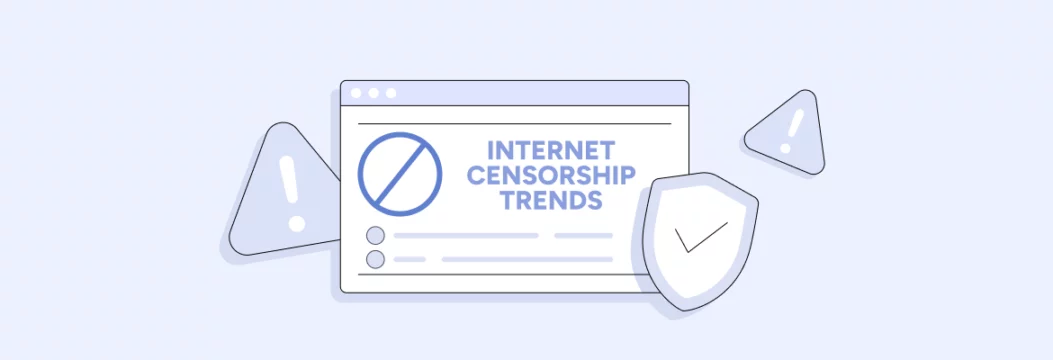
Internet censorship stats
We’re not looking to present you another “conspiracy theory” article with the idea that Big Brother is watching you and the mythical evil world government censors users’ access to the Internet. Let’s take a look at the censorship statistics provided by the Michigan University. After collecting 21 billion measurements across 221 countries over 20 months, they found an uptick in Internet censorship incidents in 103 countries. That’s nearly half the world!
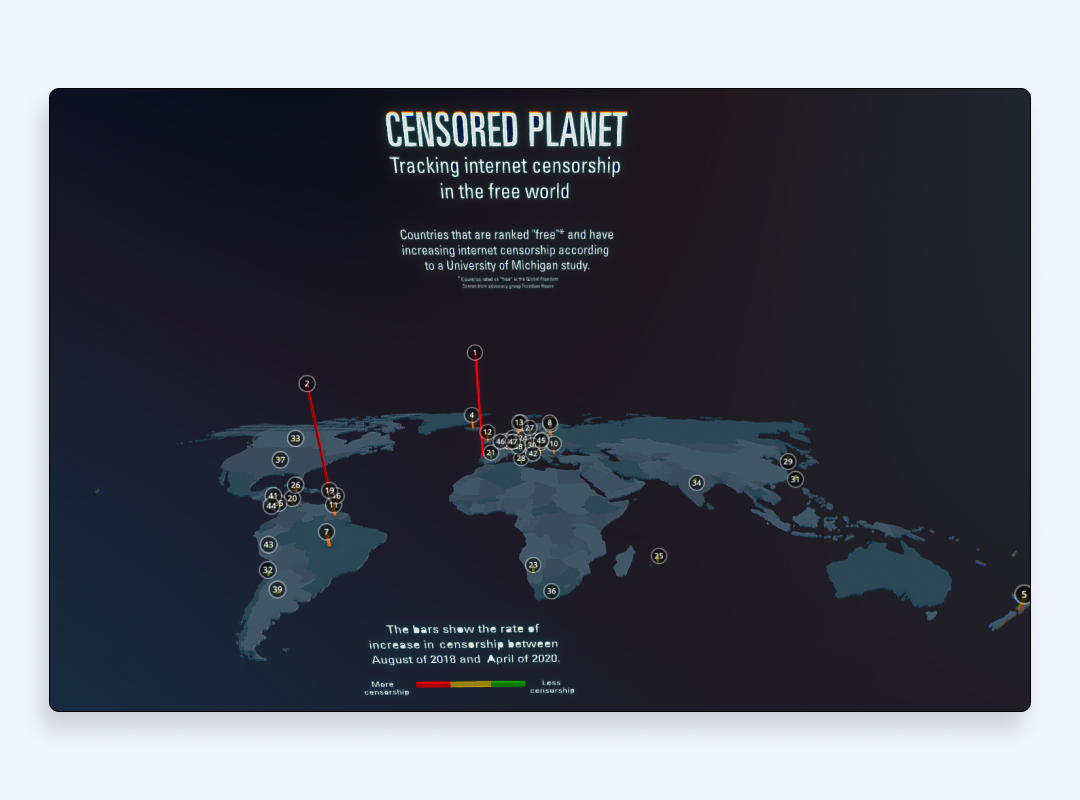
Need to mention here that these measures don’t just happen in countries known for having the most strict censorship policies like Russia, China, or North Korea. They’re also cropping up in such democratic countries as Norway and Japan. It’s becoming more and more challenging for Internet users to feel secure and have their Internet access truly free.
Global Internet censorship: a breakdown by countries
The following overview of countries is based on research from Freedom House, the Censored Planed project we already mentioned, and news that highlights the extent of content blocking in particular countries or regions. We also added legal frameworks that are accepted in countries that restrict digital speech. We will first examine authoritarian nations known for strict Internet censorship and then move on to unexpected democracies that have begun to enforce digital restrictions.
Countries with “digital iron curtains” you are likely to know
Below is the list of the world’s most heavily censored nations. Read what exactly they censor and how they enforce Internet restrictions:
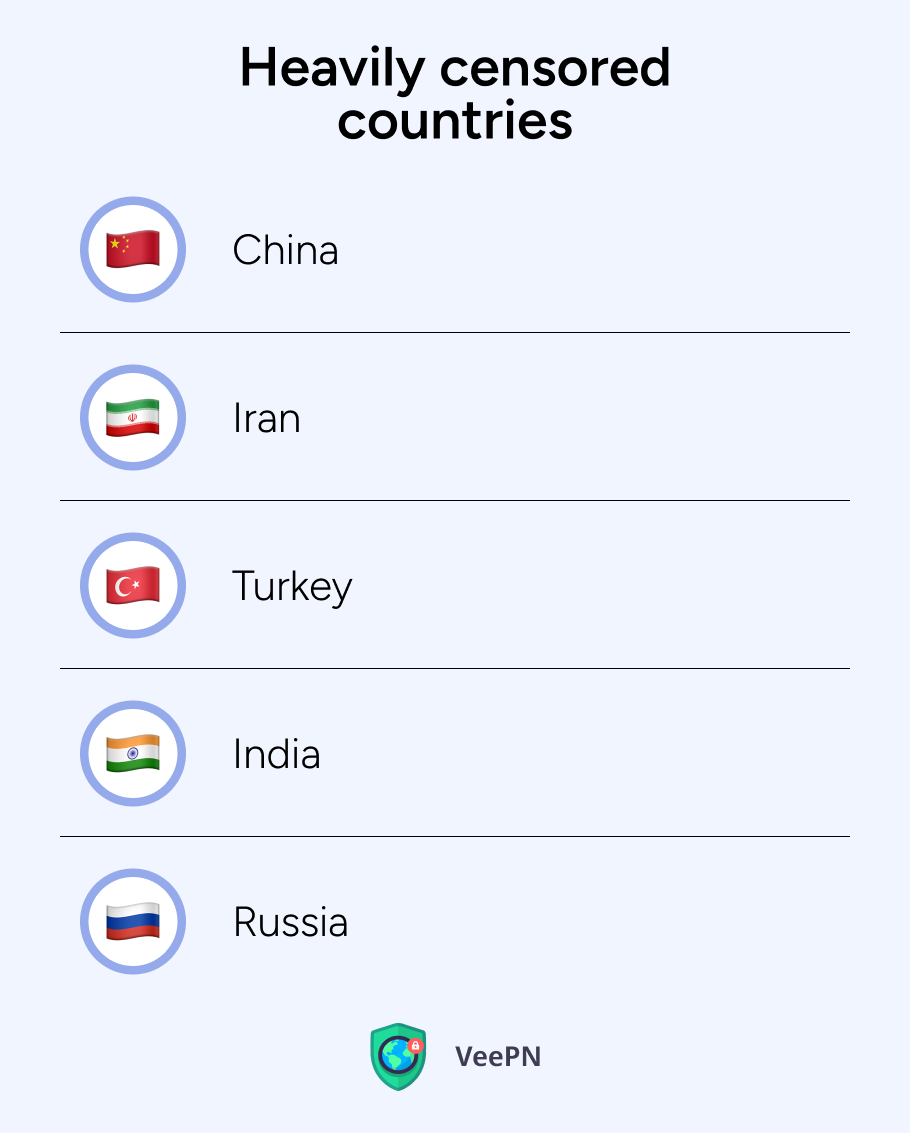
China
The Internet censorship in China is still enforced by its Great Firewall. They have also blocked thousands of additional websites, including Artificial Intelligence platforms such as ChatGPT, Microsoft Copilot, and Hugging Face. Recently, Chinese developers launched a modern AI chatbot DeepSeek. Discover whether it is safe to use.
Iran
Iran continues its tradition of blocking news outlets, messaging apps, and popular social media platforms, a direct response to nationwide protests and calls for reform.
Turkey
Turkey, meanwhile, has blocked over 450,000 websites. News outlets and activist networks are among the first casualties, with official statements often blaming “national security.”
India
The Indian government imposes many shutdowns and takedowns of content. Its authorities restrict online speech by regularly ordering the blocking of websites and social media posts that are critical of the government, especially during politically sensitive periods.
Russia
Internet censorship in Russia continues to ramp up demands to remove “unapproved” information from local and international news sources. Social media is monitored heavily, with new penalties for those who criticize government policy. Platforms that fail to comply with takedown requests are blocked or fined.
Talking about countries with Internet restrictions, the situation there is obvious, true. But our point here is to use their example and show how this wave of clampdowns reached democracies once perceived as great examples of Internet freedom.
“Free” countries you didn’t expect to tighten the screws
One of the most alarming discoveries from the University of Michigan’s Censored Planet project is that many nations labeled “free” by advocacy groups are quietly adopting their own forms of Internet censorship. This is though happening at the Internet service providers level rather than through a single national firewall.
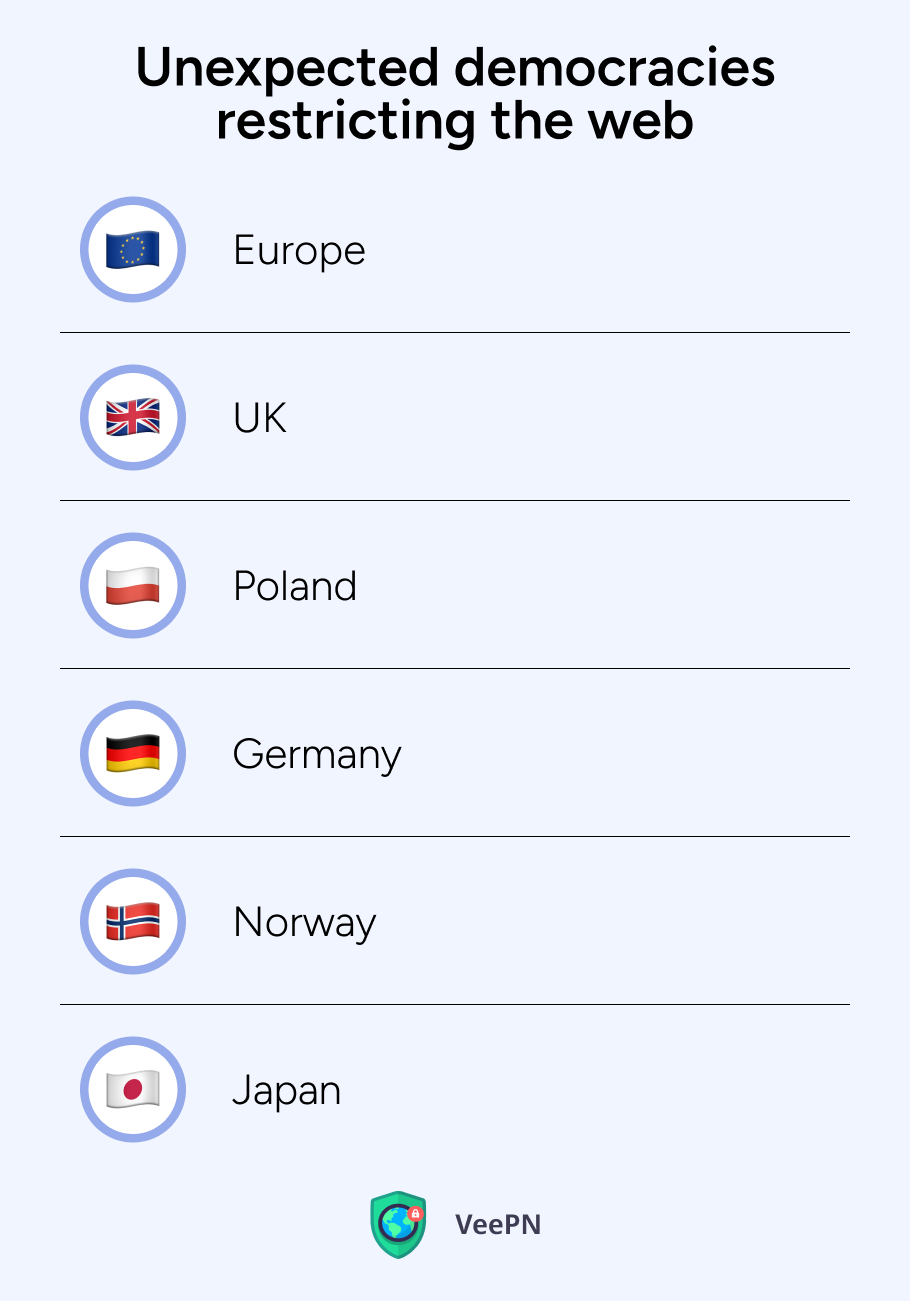
The UK and Europe
At a glance, discussing Internet censorship in Europe or the UK might sound surprising. However, these regions have passed legislation that obliges digital platforms to remove or block content deemed “illegal” or “harmful.” Namely, these are the Online Safety Act (OSA) in the UK and the EU’s Digital Services Act (DSA). Critics argue these rules frequently lack transparency and can even empower bureaucrats to dictate what content is allowed, and this may suppress legitimate speech.
Poland
Demonstrations in 2019 triggered a wave of censorship on government websites and independent news portals, especially around protest coverage. Local activists continue to notice random site shutdowns at pivotal moments.
Germany
Germany enforces strict hate speech laws. It criminalizes insults, defamation, and Holocaust denial under “provocation to hatred.” While political expression is protected to the moment, speech that threatens democracy can lead to bans on extremist organizations. Legal experts and free speech advocates now argue that censorship fuels political polarization rather than preventing it.
Norway
Norway has expanded its censorship measures by introducing DNS blocking to restrict access to unlicensed gambling websites. Under the new legislation, Internet providers must redirect users attempting to visit banned sites to government landing pages explaining the restrictions.
Japan
In 2019, leading up to the G20 Summit, news portals were sporadically cut off. Recent laws in Japan have increased penalties for online defamation and broadened government oversight of digital communications.
Interestingly, many of these instances often come packaged with benign justifications, saying that the governments are blocking “extremist content” or preventing illegal gambling. But a fun fact is that these abrupt blackouts usually align with politically sensitive moments.
How it goes from child safety to political censorship
You might wonder: how does something as innocuous as blocking sensitive material or NSFW content turn into widespread online content control? The process often happens in the following stages:
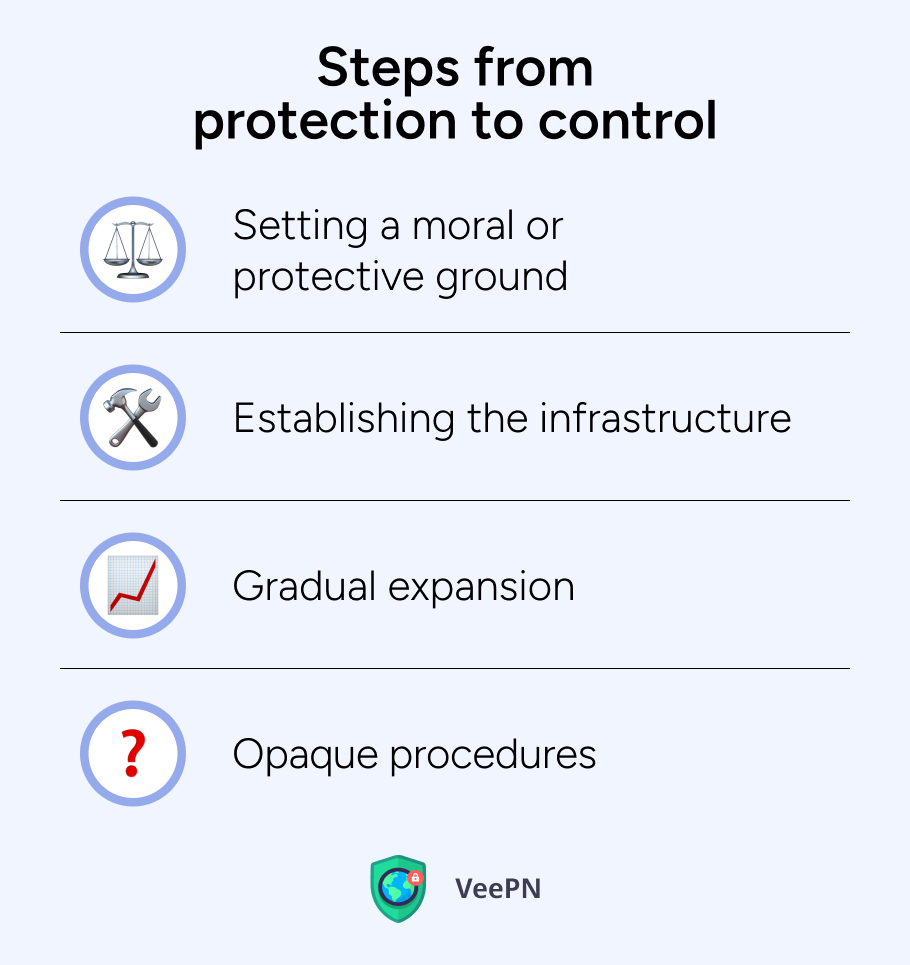
Setting a moral or protective ground
Governments begin by blocking undeniably harmful content, be it exploitation materials, terrorist propaganda, or large-scale piracy. Citizens rarely object to these moves because the intent seems justified.
Establishing the infrastructure
Once the technology for ISPs to block websites is in place, with filters, blacklists, and algorithmic systems set up, expanding the scope becomes relatively simple for lawmakers.
Gradual expansion
Over time, authorities may include additional categories of content that is “defamatory,” “offensive,” or “posing security risks.” Without a clear explanation of these definitions, these categories can broaden to bare Internet censorship that encompasses political dissent and human rights journalism.
Opaque procedures
Finally, the entire system is protected by vague laws or minimal transparency. Internet users express concern, but only after they realize that the gatekeeping goes far beyond rightful blocking and suppresses broader discourse.
So overall, Internet censorship pros and cons can be really tricky to sort out. In principle, no one wants harmful material floating around, but in practice, these rules can become tools to stifle the free expression of opinions. Let’s explore how governments impose Internet censorship today.
Common tactics for Internet censorship in 2025
Different governments use different methods, but these strategies have become increasingly popular in many countries:
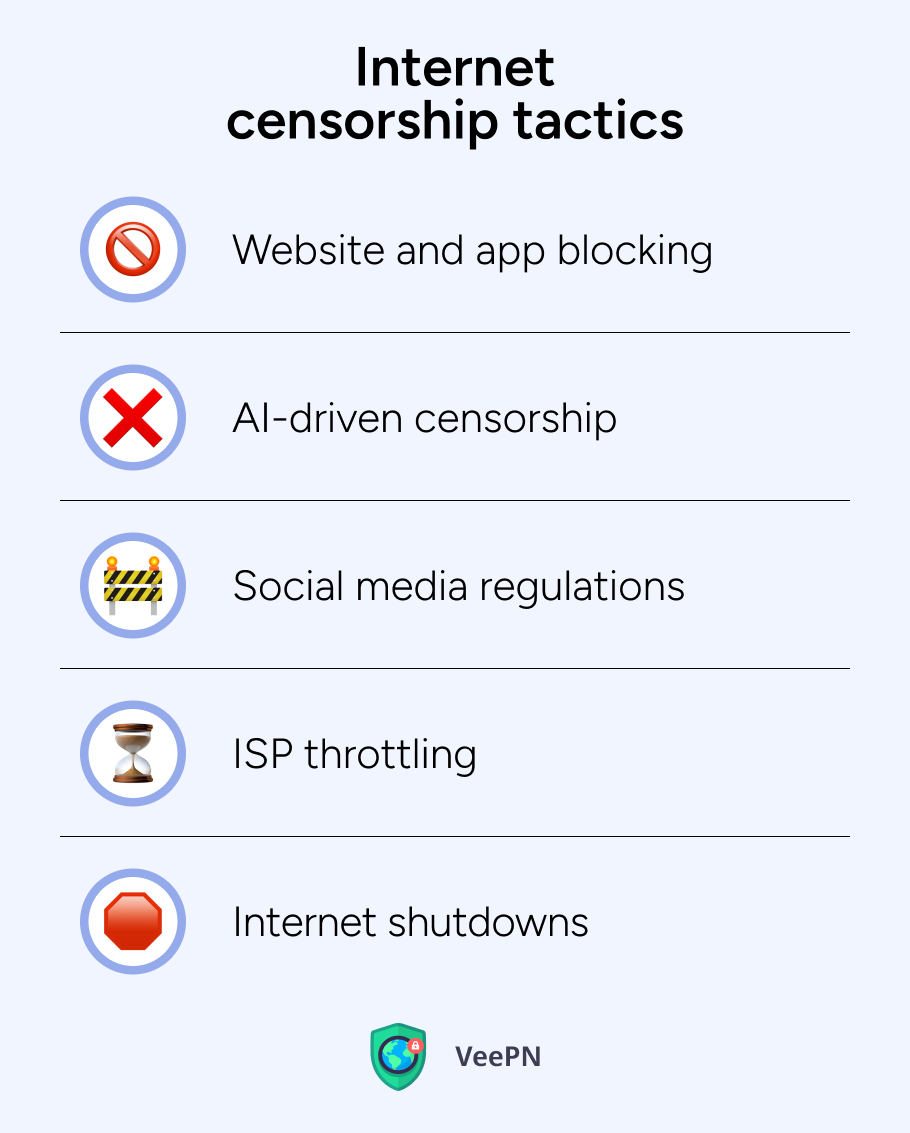
Website and app blocking
From major messaging services to lesser-known forums, entire domains can vanish overnight. Governments use legal mandates or technical tools like DNS tampering and deep packet inspection (DPI) to enforce blocks.
AI-driven censorship
Automated monitoring sifts through billions of posts and images, instantly removing or throttling content. AI-based filtering is steadily growing more sophisticated and fuels more widespread Internet censorship incidents.
Social media regulations
In some democracies, new “hate speech” or “fake news” laws require platforms to remove flagged posts within hours. Otherwise, platform owners can face huge fines. This accelerates social media restrictions and places platforms under constant pressure for heavy moderation.
ISP throttling
Governments pressure or mandate ISPs to slow down access to specific websites, services, or platforms. This is a form of soft censorship governments can use to make certain information difficult to access without outright banning it.
Internet shutdowns
Authorities sometimes use full or partial Internet blackouts, especially during protests, elections, or conflicts. Some regions experience prolonged shutdowns, cutting off entire populations from communication and information just like it happened in India in 2024.
So now you know how exactly your access may be restricted to some news or content the government doesn’t want you to be aware of. But why should it bother you and many Internet users?
User worries about censorship
There’s a decent chance you’ve felt uneasy when a website you visit quite often suddenly becomes inaccessible. These are the most common concerts about rising controls over Internet access users may have:
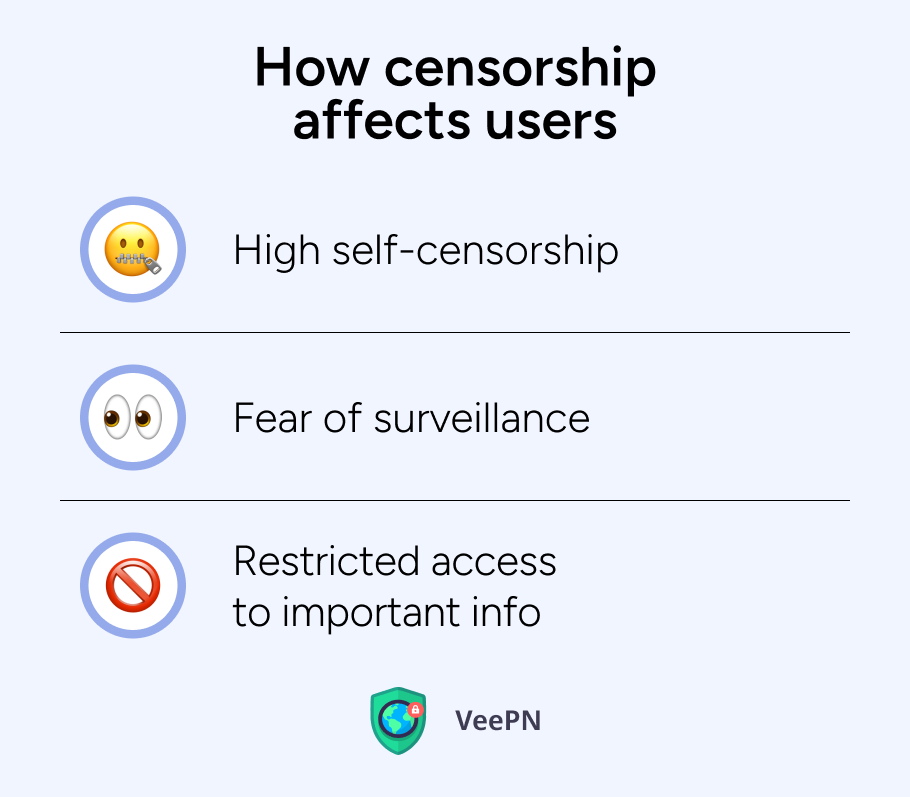
Higher self-censorship
Internet users may shy away from discussing politics or sharing news stories because of worries about potential backlash. Many have started avoiding controversial topics altogether, fearing their social media posts or messages could be flagged or used against them.
Fear of surveillance
Vague data-sharing laws in many countries and data monitoring on numerous social media and other platforms make users feel that Big Brother is always watching them and knows what they’re doing out there on the Internet.
Concerns about restricted access to important info
Some Reddit users share that they find censorship scary. If the information, news, and updates are concealed from the public, then governments may not want people to know some critical and important things.
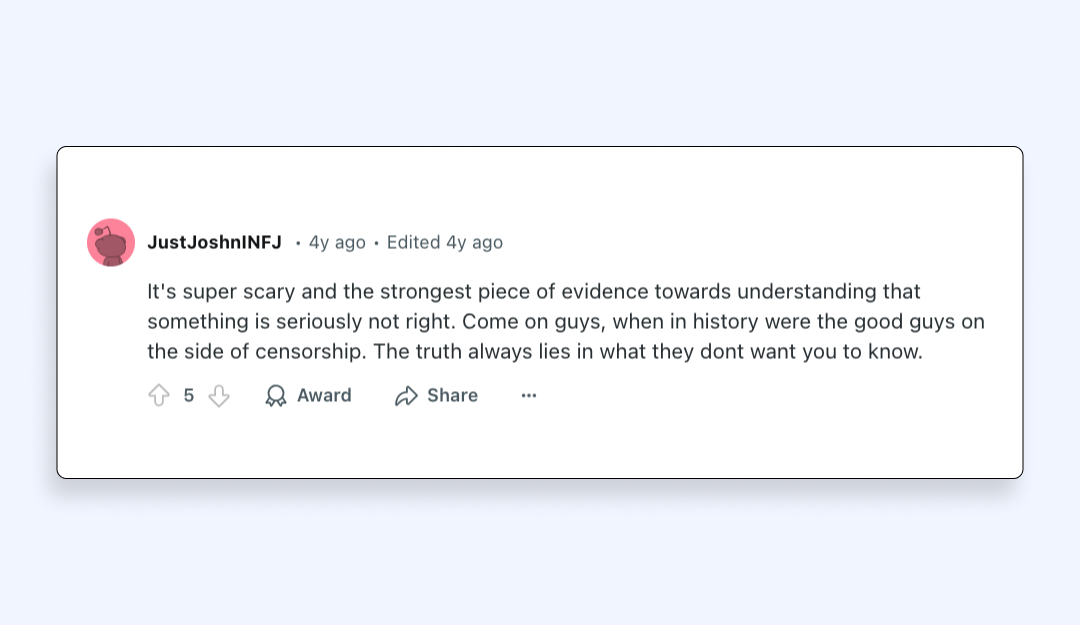
All in all, the Internet blocking cost for users is high. What is reasonable to ask here is how to overcome this. The answer is VPN. Read along to learn the details.
VPN as the way to bypass censorship and reclaim online freedom
Amid these bleak trends, there’s a silver lining for those who aren’t willing to give up on a free and open web. Many are turning to VPN service providers to bypass Internet restrictions and secure their connection. Here is how VPN helps:
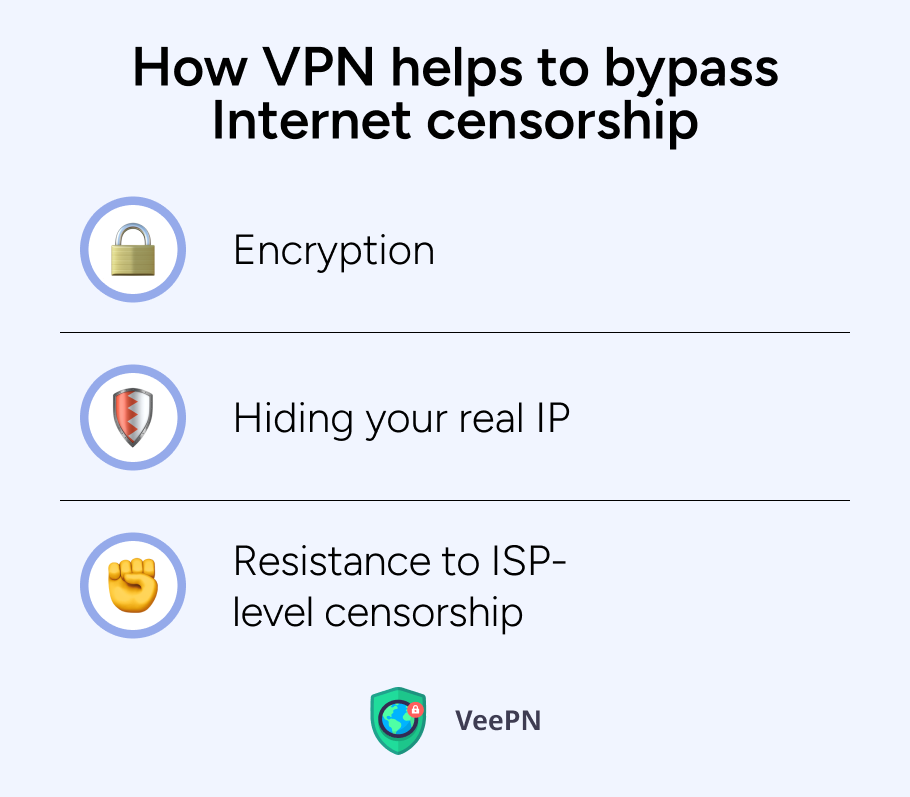
Traffic encryption
VPNs encrypt your traffic to disguise your data so that snoopers, whether they’re state agencies or hackers, see only scrambled signals. This is especially needed when you’re on public Wi-Fi. However, there are different VPN protocols, so take care to choose the best that fits your browsing needs.
Hiding your real IP
This is a vital point for securing your Internet privacy. A good VPN masks your IP address, this way shielding you from the local filters that block certain websites or apps. With a VPN, you can access global news, any sites, or streaming services from anywhere in the world, forgetting about geoblocking.
Resistance to ISP-level censorship
When your traffic is encrypted and rerouted, your ISP can’t easily throttle or blacklist the sites you visit because it can’t precisely see what you’re up to online.
However, not all VPNs are made similar. Free VPNs might not give you the benefits you expect from them.
Why free VPNs are not good
They may seem to be an attractive option, but they often come with:
- Weak encryption standards. Free VPNs can make your data vulnerable to different leaks and cyber threats.
- Bandwidth limits and speed throttling. This usually leads to slow and unreliable Internet connections. How does it feel? Unbearable! Especially when you’re trying to stream content or gaming.
- Tracking and selling user data. Free VPNs usually trade customer privacy with third parties to keep their platforms running. Such actions undermine the very privacy they pretend to offer.
So, if you think online freedom and security matter, then it’s better to use a safe and reliable VPN service like VeePN.
Use VeePN for uncensored browsing
Among many VPN options, VeePN stands out for its features for your online privacy:

Strong encryption
VeePN offers top-tier AES 256-bit encryption. It ensures that government filters or prying eyes have an extremely hard time inspecting or blocking your traffic.
Global server network
Having 2500+ servers spread across 60 countries helps you dodge local blackouts and ban social media attempts. You can pick a server in a region that maintains more relaxed Internet censorship pros and cons policies to effectively sidestep local blocks.
Strict No Logs policy
Always think about your activity logs being stored somewhere? VeePN has a strict policy of not recording your browsing data. Even if anyone demands logs, VeePN has nothing to share.
Stealth VPN feature
Some restrictive governments and ISPs use deep packet inspection to detect and block VPN traffic. VeePN’s masking technology disguises VPN traffic as regular HTTPS traffic so that it is nearly impossible for authorities to detect and block you.
Double VPN
VeePN routes your traffic through two different VPN servers in separate locations. Thus, you get an additional layer of encryption and anonymity.
Unlimited bandwidth and fast connection
Unlike free VPNs that throttle your connection, VeePN provides unlimited bandwidth and special high-speed servers for your fast and smooth streaming, browsing, and uninterrupted gaming.
Try using VeePN without risks with a 30-day money-back guarantee.
FAQ
Iceland and Estonia still strive to keep their web open and aim to protect Internet freedom. Still, changes can happen if their governments introduce new regulations or blocks. However, there’s always a way to enjoy browsing without limits with VeePN.
Almost everyone, from journalists and activists to ordinary users on major social media platforms. Communities and even nations in particular countries can lose their voices, especially when critical news sources or forums are blocked. But you can still browse the net without limits with a premium VPN service like VeePN.
Increased security concerns and political agendas fuel worldwide Internet censorship by countries, as many governments claim it maintains order or combats misinformation. In reality, though, these measures often limit diverse viewpoints and hinder open discourse. You can easily bypass all these with VeePN, a trustworthy VPN service provider.
Governments and social media platforms see it restrains illegal activity and hate speech, but Internet censorship can also restrict free speech and reduce free Internet access. In moderation, it might protect users from harmful content, yet too much control can silence valid opinions and stifle innovation. Not to let it happen for you, consider using VeePN to enjoy free Internet without limits and protect your online privacy.
VeePN is freedom
Download VeePN Client for All Platforms
Enjoy a smooth VPN experience anywhere, anytime. No matter the device you have — phone or laptop, tablet or router — VeePN’s next-gen data protection and ultra-fast speeds will cover all of them.
Download for PC Download for Mac IOS and Android App
IOS and Android App
Want secure browsing while reading this?
See the difference for yourself - Try VeePN PRO for 3-days for $1, no risk, no pressure.
Start My $1 TrialThen VeePN PRO 1-year plan








